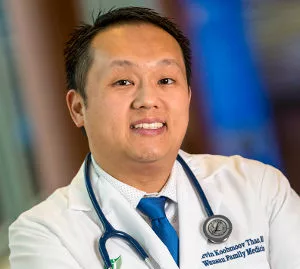Reflecting on a Career in Rural Medicine
Byron Crouse, founding director of the Wisconsin Academy for Rural Medicine, may have recently retired but his tireless efforts to improve rural health in Wisconsin will leave a lasting impact.
Wisconsin has been home to one of the nation’s largest Hmong communities for more than 40 years. And still, Kevin Thao, MD ’10, MPH ’11 (PG ’15), is struck by how startlingly little is known about the health of this population. As a result, he’s dedicated to building a better body of research, aiming to prevent long-term disease and promote healthy lifestyles for Hmong across Wisconsin and the nation.
Thao knows firsthand that there are many reasons why the Hmong might not receive adequate health care. His family arrived in Wausau, Wisconsin, as refugees from Thailand when he was 3 years old, and he is one of the first members of his family to pursue advanced education.

Factors such as language and literacy differences, cultural and medical practices, and religious beliefs influence whether populations such as the Hmong are able to access the care they need.
“The (Hmong) community has gone through a historical transition in diet, environment and lifestyle as (individuals) acclimate to life in America. These changes are having positive and negative effects on the health of the community,” he says.
After Thao earned his bachelor’s degree in medical microbiology and immunology at University of Wisconsin–Madison, he enrolled in the UW School of Medicine and Public Health (SMPH). There, he led outreach projects to improve Hmong health literacy. He translated health information into formats that Hmong patients could use and held educational workshops for local Hmong communities. In recognition of this work, the Department of Family Medicine and Community Health (DFMCH) gave Thao its McGovern-Tracy Scholarship in 2008.
The next year, he partnered with Dane County Public Health and several colleagues to launch the Hmong Health Council of South Central Wisconsin. They created several interventions aimed at preventing chronic disease and promoting healthy lifestyles in Madison’s Hmong communities, including a video on the role of diet and exercise in diabetes prevention.
After he earned his medical degree from the SMPH, Thao stayed in Madison to complete his family medicine residency and research fellowship in the DFMCH. The latter included gathering data as he engaged with local Hmong communities.
Thao’s research analyzed health and demographic information on more than 5,000 patients at UW Health primary care clinics from 2007 to 2012. Of those patients, greater than 80 percent were identified as non-Hispanic whites and 0.19 percent as Hmong.
He emerged with some important findings: many of the Hmong he studied were at high risk for cardiovascular disease. And the study showed that, after adjusting for age, sex, body mass index (BMI) and insurance status, the relative risk of diabetes is 3.3 times higher for Hmong adults than for non-Hispanic whites.
Although the study was not designed to determine the causes for the increased risk, Thao explains that changes in environment affect populations migrating from developing countries to affluent ones. Focus groups of Hmong have indicated that the change in environment leads to lack of physical activity and poor diet, factors that can lead to the development of diabetes.
Published in the October 2015 Wisconsin Medical Journal, the study also supports recommendations that physicians should screen for glucose intolerance in Hmong patients at lower ages and at lower BMIs than usual.
Having moved back to Wausau following his training, Thao is a primary care physician at Aspirus Wausau Family Medicine and a faculty associate in the DFMCH. He teaches in that department’s Family Medicine Residency Program, also in Wausau.
Thao helped form the Hmong Health Coalition of Central Wisconsin. He collaborates with the DFMCH, UW School of Social Work and local Hmong American Community Center to continue research through an ongoing survey of Hmong households in the Wausau area.
He is especially thoughtful about what it means to provide culturally inclusive health care, and he promotes cross-cultural communication between the medical and Hmong communities. Importantly, he says, physicians already have a powerful way to help Hmong people live healthier lives: listening.
He advises his fellow doctors to use the standard tools that they’re taught for motivational interviewing, and to accept what patients tell them in order to help them find solutions to their health needs.